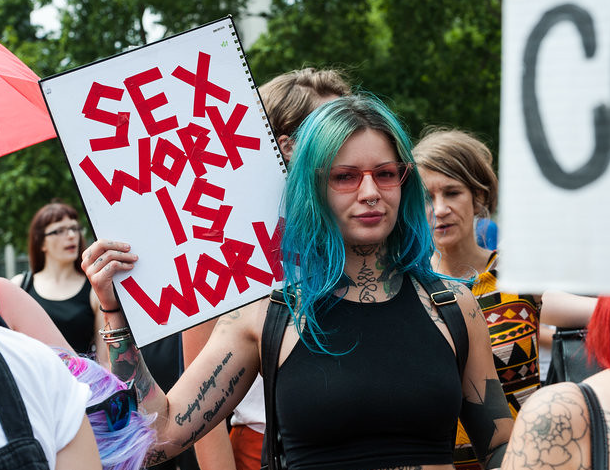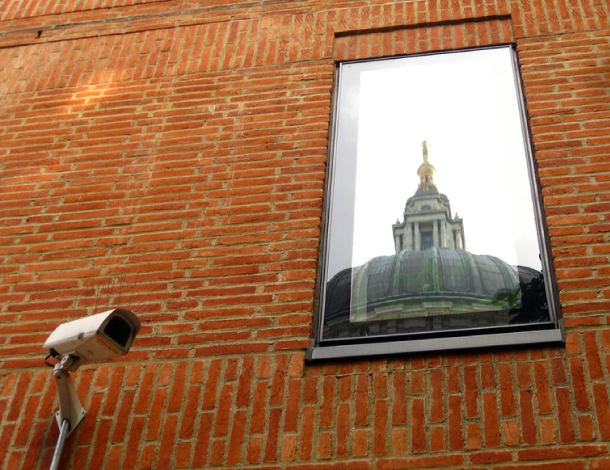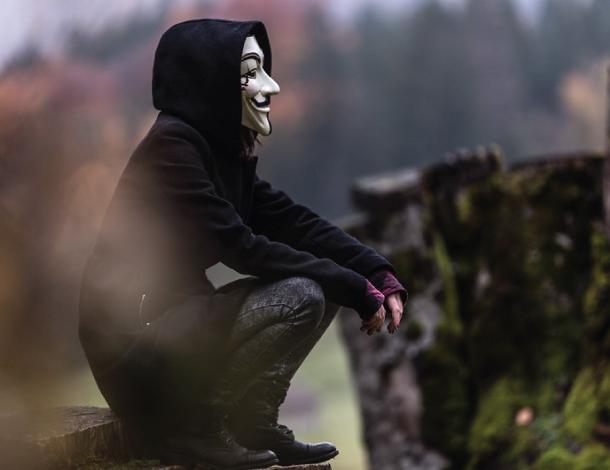Against bleak ghosts of familiar urban landscape and CCTV cameras labelled “for your protection” the news on the radio skits between weather forecast, rationing, raids, a special public appearance by the queen, politicians promising increased production and London quarantine zones to be avoided “for reasons of health and safety”.
- Impressions from V for Vendetta, 1982

Long before the eerily similar sights and sounds of current pandemic times, the London-based sex workers internet radio station Radio AvA (The Xtalk Project) treated listeners to a satirical reading of the opening panels of Allan Moore’s graphic novel V for Vendetta, published between 1982 – 1988. The main object of our critique was the character of Evey Hammond: an underage girl attempting to sell sex in a totalitarian near future imagined during the Thatcher regime.
Evey ventures out to Westminster Bridge, and clumsily propositions a man in a trench coat. Her first stab at sex work – the only way to supplement her meagre income toiling at the munitions factory. But the man Evey approached turns out to be an undercover police officer, in our past-present-future, where prostitution is highly criminalised. Joined by his lurking colleagues, the policeman preparers to rape and murder her.
In both the comic and the Wachowskis’ 2005 film, Evey is rescued by a cloaked dissident sporting a Guy Fawkes mask, flowery language and fantastic combat skills. However, you will not find even attempted sex work in the Hollywood version of V for Vendetta. In the film, Evey is a slick twenty-something working as a runner on a TV talk show, out on the streets after curfew. Intriguingly, while in the Thatcher era comic the harbinger of quarantine, rations, surveillance, and social cleansing was a nuclear war, in the film – produced during the Bush administration – the culprit was a man-made virus.
There are plenty of iconic works of fiction echoing our present, some featuring far more captivating sex workers – and female or gender bending – characters than Evey. But V for Vendetta, haunts me now due to three resonating aspects of Covid 19: safety, surveillance, and masks.
Save lives: work the fuck from home
Our comrades in the left and government announcements alike are ceaselessly urging us to stay home in order to save lives. To walk out of workplaces or work from home to protect “front-line” workers, who can’t. Many of whom, like myself and a large number of sex workers, are migrants and/or people of color. Most are badly underpaid and mistreated. Which goes a long way to explaining why so many sex workers – myself included – have also worked as nurses, carers, and cleaners.
We are all in this together, and to #staythefuckathome should be a simple matter, because unlike nurses, cares and cleaners, sex workers can work remotely from home. Furthermore, like other non-essential in-person workers, such as therapists, private teachers, and yoga instructors, some of us already offer online services.
Fine. We should stay the fuck at home and work the fuck online, right?
Indeed, many sex workers and community projects – including Radio AvA – are ardently sharing resources and fabulously creative ideas of ways to work online. The main online marketing platform used by sex workers in the UK has removed the in-person bookings option, while camming, porn sites, and social media sex platforms see a massive surge in demand and supply.
I want to save lives, to be safer, and have not seen a client for over a month. But even with my savings quickly dwindling and a looming housing crisis, I still do not dare to take my sex work online.
While I just about managed the transition from brothel shifts to working ‘independently’, I am far from confident I have what it takes – and can afford – to sell virtual sex. Regardless, soon I’ll have to try. And I am terrified: this is the first time since working without a permit in a country I did not speak the language of, that I may be forced to delve into a branch of sex work that I find extremely dangerous.
I am no longer in the same sinking boat as other migrant sex workers who do not have the right to work or access to (however insufficient) public funds. Unlike many sex workers relying on out-calls or brothels, I do not (yet) have to hide my job from misogynist and violent partners or housemates, thus risking outing myself and becoming homeless by being forced to work remotely from home.

So why can I not stop worrying and learn to navigate, if not love, online sex work for the sake of saving lives?
This brings us to the second timely theme of V for Vendetta: surveillance.
The fingers in the sky
In a sense, the first villains introduced in V for vendetta are not the raping murdering cops (Also Known As ‘Fingers’) but the CCTV cameras and the prime minister’s object of desire: a super-spy computer named Fate.
For years, with whore stigma and the Home Office very much in mind, I refrained from offering online services and disguised my face on profile pictures, mindful of the manifold risks including hacking, outing, and personal data leaked to stalking clients and authorities.
Those are some of the reasons that many migrants or others concerned about the consequences of outing avoid traceable online advertising altogether and opt to work in brothels, outdoors, clubs or saunas. This comes with other risks, like fines and abusive working conditions, and in the United Kingdom (UK), like raids and deportation, because working more safely with friends or peers is criminalised.
In London 2020, we don’t yet have a law like SESTA / FOSTA (and the looming EARN IT act) which makes advertising sexual services online illegal in the United States (US) – where all sex workers are also banned from a government emergency fund.
But it is no accident that the surveillance of Londoners is a major theme of V for Vendetta.
UK governments are big on snooping, and recently are especially concerned with what kind of sex can be sold and shown online. They are also rather keen on spying political activists, and have combined those interests in a series of legislative efforts. Those range from the Audiovisual Media Services regulation of 2014 (AKA “the face sitting ban”) which focused on what kind of female sexualities are permitted on Video On Demand (VOD), through The Investigatory Powers Act (AKA “Snoopers Charter”) of 2016, which allows tracking of internet usage, to the Digital Economy Act 2017. An aspect of the latter –ID checks on online erotic content viewers and consumers – was eventually shelved last autumn thanks to privacy campaigns and due to implementation issues. It was, however, replaced by the nebulous Online Harms White Paper featuring the usual dangerous mishmash of sex, children, and terror.
You see, unlike yoga instructors, sex workers setting up to work the fuck from home and save lives are viewed by the powers that be not as workers, but as a danger to others and ourselves. A contaminating element. A virus, if you will, in the wholesome virtual body, not an integral part of the “we” who are in this together.
According to my experience and knowledge, a discourse of safety and protection is always bad news for stigmatised and marginalised peoples.
Police raids on migrant women and people of colour are rebranded “welfare checks” and “rescue operations” and further criminalisation of sex workers in-person, online, and across borders is camouflaged as worthy campaigns to protect and “safeguard” vulnerable women and children.
With this particular pestilence basically recasting sex with non-live-in partners – not to mention new or casual ones – as a mortal sin, and the Emergency Coronavirus Act vastly enhancing powers of surveillance and enforcement, it is hard not to fear being prosecuted in the name of safety and social hygiene.
Demands to police a popular UK social media sexual services platform, which I am reluctantly considering trying to work on, were already published in April by a prominent abolitionist. The writer seem to feel that one of the happy side-effects of Covid 19 was brothel closures, and that sites selling virtual sex should go down next.
According to this line of thinking, sex workers are vectors of social disease even if we stay the fuck at home and work the fuck online. This, not our safety, is the real reason they try to pull the plug on our remaining work options while simultaneously toiling to ensure we have no workers’ rights – which would afford us the material conditions to refuse risky work, conspire to make migration much harder - especially for women - do very little to abolish poverty, and fan the flames of the killer whore stigma in times when all people outside a normative household are suspected vessels of infection.
If our saviours have their way, sex workers would be completely eradicated. Cleansed from the streets, the homes, the screens.
This is why centralisation is one of the greatest threats to sex workers’ safety with our work limited to the virtual sphere.
It is not easy to close down every brothel and working flat, to trace and prevent every outdoor worker or independent escort from plying our trade. But it is, as our comrades in the US learnt in 2018 when SESTA / FOSTA hit, terribly easy to shut down online platforms, making sex workers destitute – and homeless. A threat which on July 4th 2018, had sex workers fiercely protesting in Parliament Square to stop a labour Member of Parliament (MP)’s attempt to introduce a similar ban in the UK.
When the internet becomes not only our advertising space, but also the workplace itself, we are dreadfully vulnerable to sweeping and effective virtual raids and erasure.
Furthermore: conducting all our work online makes it a hell of a lot easier to monitor and censor the kinds of sexualities sanctioned by commercial platforms and the state. This, incidentally, is also true of remote teaching.

Sorry to be a killjoy, but this brave new work order does not make me feel safer.
In the UK, saving profits, not lives, is at the heart of the Covid 19 government policies. So rather than having an early lockdown enabled (and conditioned) by decent universal income, tests on demand, personal protective equipment (PPE) for all, status for migrants and amnesty to prisoners, a functioning health system, and all the other sensible ways to ensure degrees of safety, we are told that some of us could and should go back to work soon, and that the magic key is digital contact tracing.
Yes, we must demand tests for the people – though not conducted by the army, nor forced testing, compulsory detention of the sick and vulnerable or mobility and employability hinging on bio-IDs. But contact tracing, while likely effective in slowing Covid 19, will rapidly spread other deadly ills.
Sex workers are already dealing with social media platforms outing us to clients – based on phone location data, history, and contacts. Having every encounter with another phone-carrying human documented and our contacts shared is terrifying. Coupled with the dangerous spectre of anonymous reporting, this is every vindictive partner’s, stranger’s, and violent clients’ wet dream.
A more insidious threat to sex workers and other marginalised people that the pandemic has brought us is not state surveillance, but informers’ culture. The lovely neighbourhood mutual aids groups are already tainted with people photographing and shaming those breaching lockdown and social distancing. UK police forces have online snitch-forms, posted on some of the aid groups chats. And neighbours with time on their hands are peering through their curtains to report wrongdoers.
In fact, Radio AvA is struggling to find a space to make our two socially-distanced humans and call-ins-based pandemic shows – precisely because of the risk of crew members hosting the show being made homeless through reports of overzealous neighbours.
Now, before the plague, many sex workers worked the fuck from home in-person. Which is criminalised in the UK even if you chance being attacked by working alone - unless you are the homeowner, because it’s illegal to profit from a prostitute’s rent. So we are always in danger of losing our homes if neighbours or landlords decide we are agents of contamination. But now, with everyone’s comings and goings so carefully monitored – and astronomical fines imposed on sex workers – this risk has massively increased. Even more so for outdoor workers, who are overexposed to moral vigilantes and policing at the best of times.
Under lockdown, being on the street, or in parks, not attired in domestic, sporty, or key workers uniforms or reasonable excuses, not to mention walking with people who are not members of your household, instantly brands us – and every marginalised person, especially women and gender non conforming people – as a threat to public health.
I know, we should save lives and avoid doing in-person work for now.
Which I’m sure we would all love to do if we could get furlough. Access to (sufficient) public funds or industry grants. Work permits. Workplaces and clients to return to in the fullness of time. Regulated residency status. We really don’t want to die or kill others. I wish the lovely concerned neighbours would keep that in mind, and rather than informing and condemning, join our demands for sex workers’ and all migrants’ rights.
Don’t forget that we are never the only ones affected by the regulation of suspect behaviour and movement. Despite the Wachowskis’ shady motives to turn Evey the amateur sex worker into a fledging media woman, TV Evey still gets attacked for daring to walk the streets alone at night. And the would-be rapist-murderers are undercover law enforcers, acting with impunity with no bystanders able or willing to intervene.
Because the whore stigma always applies to all unattached, dissenting, women, queers, and trans people. And ‘informing’ on women wandering where they don’t belong outside of the sanctioned ‘bubble’ or household and accusing them of being sex workers is a very old misogynist, racist, trick.
Tell me what you’re wearing
They tell us that staying and working the fuck from home or not working to save lives – including our own, and the associated restrictions, surveillance, and repressive norms, are only temporary emergency measures.
But I grew up in a country that inherited emergency laws from the rule book of two imperial powers. Where those laws and ordinances are adapted, updated, and utilised – selectively – to support and impose a constant state of crisis, on everyday life. To enforce racism, militarisation, poverty, curfews, and segregated zones, and hard-to-come-by permits to move between them. The digital contact tracing technologies currently used by this nation state were already implemented to control people of oppressed ethnicities and activists.
However, having participated in resistance movements under emergency measures, I can also detect some aspects of the current crisis which could allow and incite us to offer each other genuine protection – and foster wonderful collective transformations.
Those are symbolised by the final evocative aspect of V for Vendetta:

Masks are essential items in many sex workers’ toolbox. We use them to protect our identity in promotional visuals, for fantasy role play, and, sometimes, when we take to the streets to fight for our rights. Historical sex workers protests, such as the occupation of the Holy Church in Kings Cross in 1982 by local sex workers and the English Collective of Prostitutes were led by mask-wearing woman.
But in the biggest and feistiest contemporary sex workers’ action in London, the sex workers’ strike march which started three years ago as part of the International Women’s Strike on March 8th, many of the customary masks were either discarded altogether, exchanged with more playful forms of disguise, or transformed from the dainty masquerade eye mask to the militant bandanna.
In V for Vendetta (the comics), the first symbol of draconian power exploding in a musical light show is the old Bailey. Evocatively, in that roaring protest a little over two months ago we marched to the Royal Courts of justice, with a kicking sound system chanting “Whose streets? Our streets!” “Sex work is work!” “Rights not rescue!” and my personal favourite “Blow jobs are real jobs and real jobs suck!”. And yes, I felt we owned those streets. That together, it was almost safe to protest barefaced.
The liberal film version of V for vendetta does indeed end happily with a mass removal of masks. But in the 1980s graphic novel Evey puts on the dissident's mask – ready to continue the struggle.
For many, the sex workers strike on women’s day was our last demonstration before lockdown and social distancing. For me, this was also the first time I wore a medical mask on the street. After the fabulous light sign spelling “Decrim Now!” was packed away, the speeches over, we started a little informal street party. When the cops started circling, gearing up for conflict, I remembered the surgical mask I had quickly grabbed from my costumes bag before I left home, just in case. And that while face covering in demonstrations is illegal in the UK, in light of the (then distant, unreal) threat of Corona, no one, not even the filth, can order me to remove it. So the new threat of the virus became a form of protection from the old threat of the violent gaze of the state.
Masks come in all shapes and forms: even virtual.
And Sex workers around the world are constantly disseminating helpful tips and organising webinars on of how to work more safely – on and off line – and share the amazing community hardship funds and resources which sprang everywhere. But to access this community support, sex workers depend on the internet – and homes, and streets – being welcoming spaces.
So yes, staying the fuck at home and working the fuck from home will be safer for sex workers – and all marginalised people only by feminists demanding rights, not rescue, including the right to work or not, make home wherever you want to be, fighting the whore stigma, and resisting policing and surveillance.
We could do even better than try to retain some of whatever used to pass for protection. In this time of our plague, people – and even regimes – are doing extraordinary things none of us would have thought feasible a month or two ago. Which means that fantastic shifts are also within our reach.
Maybe we can start by making special masks, and putting them on, together, to show that feminists save lives not through condoning hostile environments but with true solidarity – and resistance.
This article was written in April. Since then, masked demos have erupted in the US following the murder of George Floyd by a policeman, echoed by BLM masked protest against institutionalised racism and police violence across the UK.
